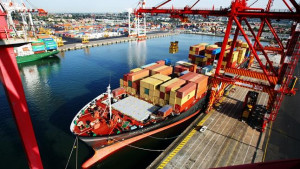
Recent news on the start of construction of Chinese military bases on the Paracel and Spratly Islands, as well as on the stationing of ground-to-air missiles on one of the islands, perturbed Australian Authorities. Australia addressed all countries involved in the conflict, calling for the termination of the militarization of the South China Sea, in which it sees a threat to the security of the region, as well as to economic development due to possible restrictions for sea and air traffic. Australia has also demanded that China stop the construction of artificial islands and has expressed its support to the Philippines, which appealed to the International Court of Arbitration in The Hague to challenge China’s claims.
In mid-February an official visit to China was held by Julie Bishop, Minister for Foreign Affairs of Australia, during which the situation in the South China Sea was one of the main issues. Julie Bishop brought up Xi Jinping’s statement from the previous year, that China does not want to militarize the challenged islands. The media first informed that the Chinese side has denied the statement of the Ministry of Defense of Taiwan that a missile defense system was stationed on one of the Spratly Islands. However, later, February 17, 2016, at the joint press conference with his Australian counterpart, Wang Yi, Chinese Foreign Minister, said that there is a legal construction of the military infrastructure on the islands under the state’s right to self-defense.
Simultaneously, Hong Lei, Chinese Foreign Ministry Spokesperson, made a number of statements, in which he urged Australian leadership to make an objective and unbiased assessment of what is happening and to avoid rash statements. He also said that the islands in the South China Sea are the primordial Chinese territory in which China has a right to station defensive targets, and has been doing so for the last decade and that it is not related to the ‘militarization’ of the region, and does not harm the free sea and air transportation in the region.
Despite the differences, the development of economic relations continues. During Julie Bishop’s visit to China, an agreement was reached on expanding cooperation between Australia and China. Commenting on the visit of the Australian colleague, Wang Yi, Chinese Foreign Minister, said that the two countries reached a ‘comprehensive strategic partnership’.
He mentioned agriculture, education, tourism, energy, and strengthening the maritime traffic between the countries among the most promising areas of the Australian-Chine
In turn, Julie Bishop said that China and Australia have been successfully cooperating in the spheres of trade and security, and that the two countries plan to run joint military exercises. However, just a week later the Australian leadership made statements, to which China reacted negatively. Thus, February 25, 2016 Malcolm Turnbull shared that Australia was planning to significantly increase its military budget and to strengthen the combat capabilities of the Navy to protect its interests in the Asia-Pacific region. It was openly said that this is due to the increase in military power of China. In addition, Malcolm Turnbull expressed support from the part of Australia to the military presence of US in the Asia-Pacific that Australian Prime Minister called “the most important strategic partner of Australia.” According to him, the US military maintains stability in the region. It is difficult to say how much current stability in the region depends on the United States, whose influence there is weakening with each year. However, the Australian leadership clearly designated its position. Perhaps, Australia wants to reinforce its own armed forces because of this weakening of the US presence. Also, Canberra has again negatively reacted to the Chinese actions in the South China Sea.
At the same time, Marise Payne, Australian Minister for Defense, said that Australia plans on military cooperation with China, which Julie Bishop talked about; however, on some issues related to security in the Asia-Pacific region, the views of countries may not coincide, and Australia will increase its presence in the region. Beijing criticized Canberra’s plans to reinforce its military capabilities. Besides, Australia has recently expressed a desire to participate in future naval exercise ‘Malabar’, which has been carried out by the United States and India since Year 1992, and in which Japan took part in Year 2015. These exercises have caused repeated protests from the part of the Chinese government.
In response, a statement of the Chinese Foreign Ministry expressed the hope that Canberra would change its position and reconsider its views on the Chinese policy.
To summarize, it may be said that the Australian-Chine
Sophia Pale, PhD, Research Fellow of the Center for South-East Asia, Australia and Oceania of the Institute of Oriental Studies of the Russian Academy of Sciences, exclusively for the online magazine “New Eastern Outlook.”
